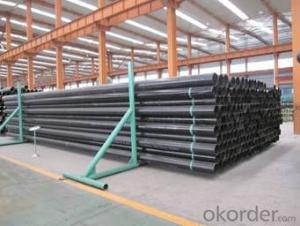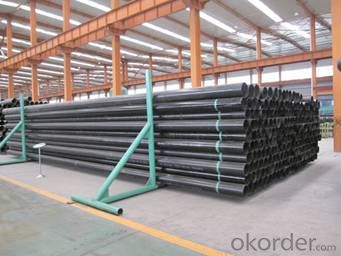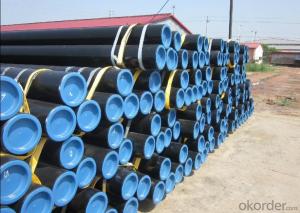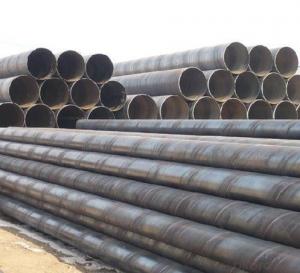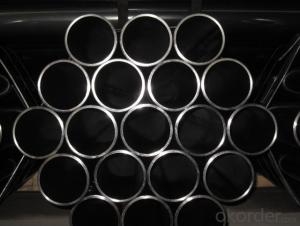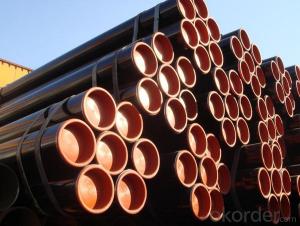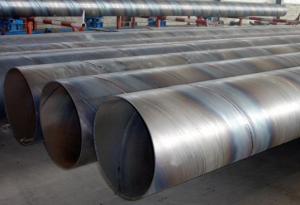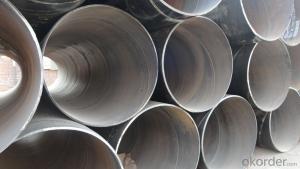ERW casing
- Loading Port:
- China Main Port
- Payment Terms:
- TT OR LC
- Min Order Qty:
- -
- Supply Capability:
- -
OKorder Service Pledge
OKorder Financial Service
You Might Also Like
OD(Inch) | 5 | 5 1/2 | 6 5/8 | 7 | 8 5/8 | 9 5/8 | 10 3/4 | 13 3/8 | 16 | 20 |
|
|
| ||||||||
Thickness(mm) | 5 | 6 | 7 | 8 | 9 | 10 | 11 | 12 | 13 | 14 | 15 | 16 | |||||||||
Grade | J55 | K55 | N80 | N80Q | L80 | P110 |
|
|
|
|
|
| |||||||||
standar d | API 5CT | ||||||||||||||||||||
Ends | Plain ends, cutting, threading, beveled, flange, etc | ||
Packing | Packing in bundle with steel strips; with seaworthy package at the end; could be done with your requirement. | ||
Certification | BV, IAF, SGS,COC, ISO or as per customer | ||
Inspection | With Chemical Composition and Mechanical Properties Testing; Hydrostatic Test, Dimensional and Visual Inspection, Also With Nondestructive Inspection | ||
Application | Urban construction pipe, machine structure pipe, agriculture equipment pipe, water and gas pipe, Greenhouse pipe, Building material tube, Low pressure fluid tube, Oil Industry pipe, etc | ||
Trade Terms | FOB, CFR, CIF, EXW, etc. | ||
Payment Terms | L/C, D/A, D/P, T/P Western Union, MoneyGram acceptable, T/T preferred | ||
Delivery Time | Usually within 10-30 days after receipt of deposit, ASAP | ||
Loading Port | Xingang , Tianjin | ||
Original Place | Shandong, China | ||
- Q: What is the role of steel pipes in the food processing industry?
- Steel pipes play a crucial role in the food processing industry as they are used to transport various liquids, gases, and solid materials. They provide a safe and hygienic means of transferring ingredients, such as water, oils, and food products, from one processing stage to another. Steel pipes are resistant to corrosion and can withstand high temperatures, making them suitable for food processing environments. They also ensure the integrity and quality of the food by preventing contamination and maintaining proper sanitation standards.
- Q: How are steel pipes threaded?
- Threading, a process that involves creating screw-like grooves on the outer surface of steel pipes, enables their connection to other pipes or fittings using threaded connections. Steel pipes can be threaded through various methods, including manual threading, electric threading machines, and hydraulic threading machines. Manual threading employs a handheld pipe threading tool called a die. The die is positioned on the outside of the pipe, and while pressure is applied, the pipe is rotated to generate the threads. This technique is suitable for smaller diameter pipes and is commonly used for on-site repairs or in smaller operations. For larger diameter pipes, electric threading machines are commonly used. These machines consist of a motor-driven spindle that rotates the pipe and a die head that houses the threading dies. The operator simply feeds the pipe into the machine, and the threading dies automatically cut the threads onto the pipe. Hydraulic threading machines, similar to electric threading machines, utilize hydraulic power to rotate the pipe and create the threads. These machines are typically employed for larger diameter pipes or heavy-duty applications. Irrespective of the method employed, it is crucial to properly prepare the pipe before threading. This may involve cleaning the pipe, eliminating any burrs or sharp edges, and applying a lubricant to minimize friction during the threading process. In conclusion, threading is a widely used and efficient technique for establishing threaded connections on steel pipes. It facilitates easy assembly and disassembly of pipes and fittings, making it a popular choice in industries such as plumbing, construction, and oil and gas.
- Q: What are the lengths of scaffold steel tubes?
- Used to build scaffolding of steel pipes in general have two kinds, an outer diameter 48mm, wall thickness 3.5mm; another kind of outer diameter 51mm, wall thickness 3mm; according to its location and role of different, can be divided into vertical pole, horizontal rod, sweeping rod, etc.. According to the technical specification for construction of steel tubular scaffold with couplers, JGJ 130 - 2011[1]. The scaffolding steel pipe should be specified with the current national standard "GB/T13793" or "straight seam welded steel pipe welded steel pipe for low pressure liquid delivery" GB/T3091 Q235 ordinary steel pipe; steel pipe steel quality should meet the requirements of current national standard grade Q235 steel "carbon structural steel" in GB/T700. The scaffold pipe shall be made of a diameter of 48.3 * 3.6 steel tubes. The maximum mass of each steel tube shall not be greater than 25.8kg.
- Q: How are steel pipes used in the construction of industrial facilities?
- Steel pipes are commonly used in the construction of industrial facilities for various purposes such as transporting fluids, gases, and steam, as well as providing structural support and carrying electrical wiring. They are durable, resistant to corrosion, and can withstand high pressure and temperature, making them ideal for industrial settings.
- Q: How are steel pipes protected against mechanical damage?
- Steel pipes are protected against mechanical damage through various methods, including the use of protective coatings such as epoxy or polyethylene, wrapping the pipes with tapes or wraps, and installing impact-resistant guards or sleeves. These measures help to safeguard the pipes from external forces, such as impacts or abrasions, ensuring their structural integrity and longevity.
- Q: Can steel pipes be used for stormwater management systems?
- Yes, steel pipes can be used for stormwater management systems. Steel pipes are commonly used in stormwater management systems for their durability, strength, and resistance to corrosion. They can efficiently transport stormwater runoff, helping to manage and control its flow. Additionally, steel pipes can be customized to meet specific project requirements, making them a versatile choice for stormwater management systems.
- Q: Can steel pipes be used for underground fire hydrants?
- Steel pipes are a suitable choice for underground fire hydrants due to their durability, strength, and corrosion resistance. They are commonly used in underground water supply systems, including fire hydrant installations. Furthermore, steel pipes can withstand high water pressures and offer a reliable and long-lasting solution for fire hydrants. However, it is important to ensure that the steel pipes used for underground fire hydrants are adequately coated or lined to prevent corrosion and maintain their structural integrity over time. Regular maintenance and inspections should also be carried out to detect and resolve any potential problems that may arise.
- Q: How do you calculate the thermal expansion of steel pipes?
- In order to determine the thermal expansion of steel pipes, it is necessary to utilize the coefficient of thermal expansion (CTE) specific to steel. The CTE represents the extent to which a material expands or contracts in response to temperature fluctuations. Typically, the average value of CTE for steel is around 12 x 10^-6 per degree Celsius (12 μm/m°C). To calculate the thermal expansion of a steel pipe, one must possess knowledge of the pipe's initial length (L0), the temperature change (ΔT), and the CTE for steel. The formula for calculating thermal expansion is as follows: ΔL = L0 * CTE * ΔT In this equation: ΔL denotes the alteration in length of the steel pipe L0 represents the initial length of the steel pipe CTE signifies the coefficient of thermal expansion for steel ΔT indicates the change in temperature For instance, suppose there is a steel pipe with an initial length of 2 meters (L0), and the temperature rises by 50 degrees Celsius (ΔT). The CTE for steel is 12 x 10^-6 per degree Celsius. ΔL = 2m * 12 x 10^-6/°C * 50°C ΔL = 0.00024m/m°C * 50°C ΔL = 0.012m Thus, when the temperature increases by 50 degrees Celsius, the steel pipe will expand by 0.012 meters or 12 millimeters. It is important to bear in mind that this calculation assumes linear expansion, which is applicable for minor temperature variations. However, for larger temperature differences or more intricate pipe systems, a more comprehensive analysis may be necessary to consider factors such as the material properties, geometry, and thermal boundary conditions of the pipes.
- Q: How are steel pipes used in the manufacturing of machinery?
- Steel pipes are used in the manufacturing of machinery for various purposes such as conveying fluids, gases, or materials, as structural components, and for heat transfer. They provide durability, strength, and resistance to corrosion, making them suitable for applications where high pressure, temperature, or heavy loads are involved.
Send your message to us
ERW casing
- Loading Port:
- China Main Port
- Payment Terms:
- TT OR LC
- Min Order Qty:
- -
- Supply Capability:
- -
OKorder Service Pledge
OKorder Financial Service
Similar products
Hot products
Hot Searches
Related keywords
